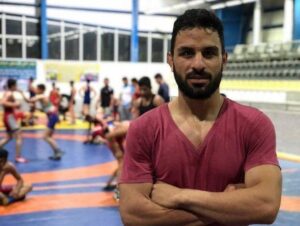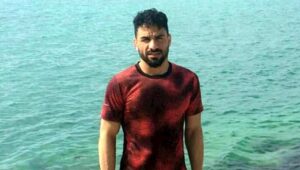
I heard of Navid Afkari’s death via a grappling forum that I logged onto yesterday evening after getting back to the Air BnB that my girlfriend and I are staying at in Cornwall. I had been loosely following the campaign for the Iranian government not to execute the 27 year old national wrestling champion who was convicted of murder during anti-government protests in 2018. Afkari’s confession, according to his family, was given under torture.
Messages from Donald Trump, UFC president Dana White and an 80,000 athlete signed petition were amongst the pleas to spare Afkari but, to no avail. Yesterday morning he was taken to the gallows and the sentence was carried out.
Hearing about the tragic death of someone that I’ve never met strikes me funnily at times. I felt a really heavy sorrow for the loved ones that he has left behind last night. I rarely, perhaps somewhat harshly, feel for the individual themselves, they are dead and gone. That’s not to say I didn’t feel for Afkari while he was alive, just a few days ago on reading another report about the attempts to save him from the executioner, I pictured how I would feel were I in his shoes; the sheer terror of knowing what was coming, the false hope of the campaign, the physical and mental torture he had been under, the immense strain on his family. In death that person is no more, all the potential, and the pain, irradiated instantly.

I woke up this morning, had my breakfast, drank a coffee and it wasn’t until an hour or so after waking, while I was in the shower, that Navid Afkari even entered my mind. As I could hear my girlfriend next door in the kitchen I thought of a line from Epictetus that I try to regularly tell myself;
“When giving your child or wife a kiss, repeat to yourself, ‘I am kissing a mortal.” This can be taken as one of the most gloomy lines in all of philosophy but, Epictetus is trying to remind us to appreciate the time we have with the ones we love, to not take them for granted, that life at any moment could take them, or us, back.
The thought of Afkari’s mother waking up today knowing she shall never hold her son again, that the thought of him and what has taken place will be in her mind, every single day for the rest of her life, weighed heavy on me.
I am someone that can become very hyper-focused on things, my work (Judo) particularly. I find it difficult to be a grateful person when immersed in something, when always battling for the next inch. That contributing idea of things not being as good as they can be providing a fierce drive. I didn’t truly feel grateful or appreciate my time at the Olympics or the Commonwealth Games because it was always “what’s next? How do I keep getting better?” I knew that I SHOULD be grateful, but knowing and actually feeling are two different things entirely.

I have been taught how to practice gratitude by a number of people that I’m close to. A small exercise that I have been shown is writing 3 things down each day that I am grateful for, it can be anything; for a good night of sleep, for having a garden during lockdown, for a nice coffee, for all the sacrifices my mum and family made for me growing up etc. When I stick to this routine I feel much more contented and, most of the time, enjoy and appreciate my day more. I don’t fully know why it works, just that, for me, a lot of the time it does.
Anti-gratitude is another lesson that I’ve been provided with. For example a few days ago my van needed some work done on it after being highlighted during it’s MOT, for a brief moment I was a bit pissed of about the extra money it was going to cost me, then, after recalling what I’ve been taught, I actually felt pretty lucky to have a decent van in the first place. My girlfriend and I journeyed to Cornwall in it, bikes in the back, leaving at a time that suited us. I’ve been extremely lucky to have travelled all over the world and have witnessed some real poverty. Most of the time I can write that I am grateful for having running water in our house and really mean it.
When I hear about tragedies such as that of Navid Afkari it reminds me to appreciate the people that I care about in my life, the fact that I have people that I care about in my life, that I still have my life, and that I get to do something that I feel passionate about with that life. I cannot change what has happened to Afkari and as much as I feel for his family’s devastation, his story reminds me how much that I have to be grateful for, and to appreciated all of it, in whatever time I have left.

